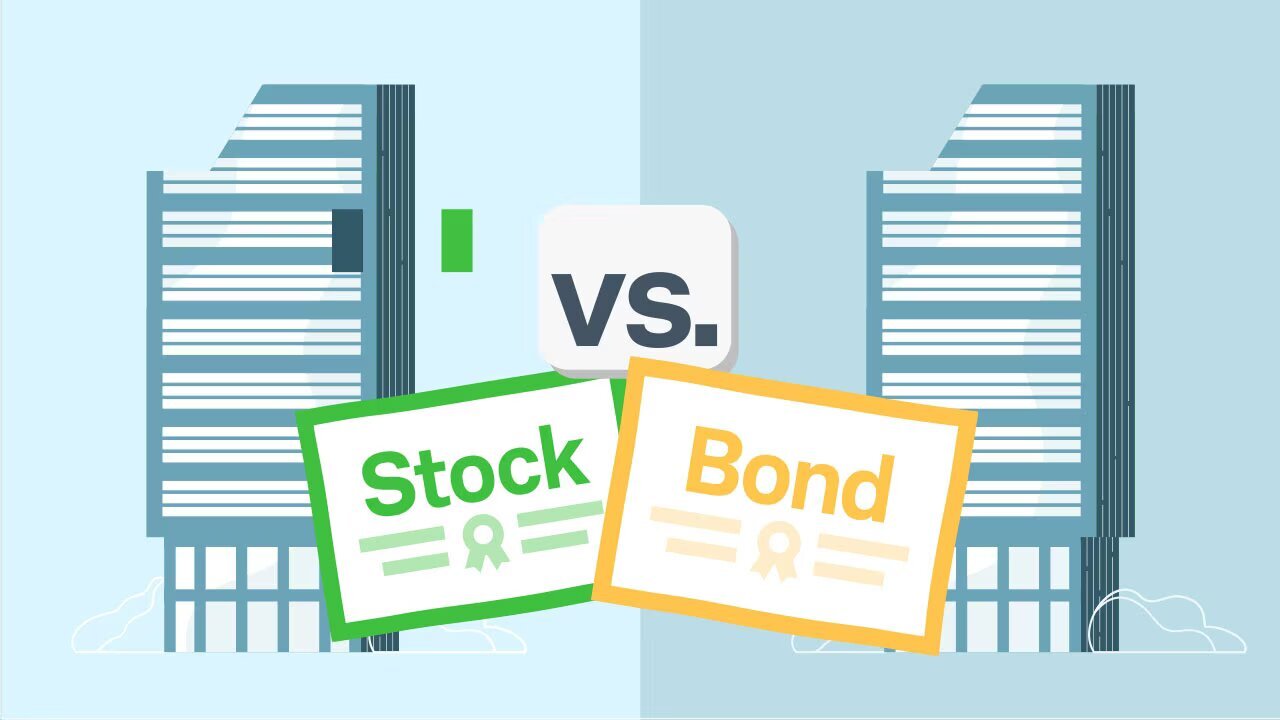Simplifying Life Insurance in India
What is the Difference between Bonds and Stocks?

source: schwab
Stocks offer you a partial ownership right in one or more organisations, whereas bonds are a fixed liability issued by an organisation or government to investors. Generally, it includes a particular interest payment and maturity date.
There may be confusion between bonds and stocks as both of them are investment options; however, they have several differences. Stocks provide an opportunity for better long-term returns than bonds. Conversely, investing in bonds is more stable than stocks. To know about bonds vs stocks in further detail, keep reading.
What Are Bonds?
What Are Stocks?
What Are the Differences Between Bonds and Stocks?
Mentioned below are the key differences between bonds and shares:
|
Aspects |
Stocks |
Bonds |
|
Value of Stock |
The value of stock varies based on the performance of the organisation. |
Bonds offer fixed income along with interest. |
|
Participants |
The participants in stock include traders, brokers, market makers, etc. |
In case of bonds, the main participants include investors, speculators and institutional investors. |
|
Returns |
The amount of returns for a stock is relatively higher. |
The amount of returns in case of bonds is comparatively lower. |
|
Risk Level |
While investing in stock, the involvement of risk is much higher. |
Investing in bonds carry a relatively lower risk. |
|
Issuance |
Stock is mainly issued by private and public sector companies. |
Bonds are issued by a government, financial institutions, private and public companies, etc. |
|
Voting Rights |
Owning stocks provides voting rights. |
There is no voting right in case of bonds. |
|
Type of Instrument |
In case of stock, the prevailing type of instrument is equity. |
When it comes to bonds, the type of instrument is a debt instrument. |
|
Tax Liability |
In case of stock, the shareholder may have to pay the Dividend Distribution tax (DDT). |
When it comes to bonds, the bond owner does not need to pay any tax liability. |
What Are the Types of Bonds?
1. Fixed-Interest Bonds
The fixed-interest bonds are debt instruments that increase coupon rates consistently during the tenure. These pre-set interest rates help potential investors to get the expected returns on investment (ROI), regardless of the prevailing market conditions. Furthermore, in this bond, creditors get to know the receivable interest rates from time to time during a long-term investment.2. Floating-Interest Bonds
The floating-interest rate bonds perform with a fluctuating interest rate according to the prevailing market conditions. Thus, the return on investment through interest income remains inconsistent and is influenced by the condition of the economy, inflation, etc.3. Inflation-Linked Bonds
Inflation-linked bonds are some specialised bond instruments that help in diminishing the rate of economic inflation on return on investment and face value. In comparison with fixed-interest bonds, inflation-linked bonds offer lower rates of interest.4. Perpetual Bonds
Perpetual bonds are rare kinds of bonds which do not possess any date of maturity. While investors would not receive their principal back, they continue to get interest payments forever. Typically, these bonds show a date of maturity when the principal amount will be repaid and the payment of interest cycle will come to an end.What Are the Types of Stock?
1. Common Stock
Common stock is the most favoured type of stock in which people make their investments in bulk. This stock signifies partial ownership in an organisation, wherein shareholders have the right to get a share of the value of any left-over asset if the organisation gets dissolved.
In the long run, the common stock usually generates better returns than other types of investment through capital growth. The higher returns are generated at a fixed cost as common stock is associated with high risks. If an organisation liquidates and become insolvent, the common stock shareholders will not get any fund till the preferred shareholders, bondholders, and creditors get paid.
2. Preferred Stock
In comparison with common stock, preferred stock works differently. It signifies the degrees of ownership in an organisation. However, it does not offer similar voting rights. Another notable benefit of this stock is that such shareholders get paid off much before the common shareholder during liquidation of the company.
Preferred stock gives the right to an organisation to buy shares from shareholders whenever they need. The net outcome of preferred stock is that it matches more closely with fixed-income bond investments than normal common stock.
Bonds vs Stocks: Which Is Better?
In case of a bond, they perform much better in short-term, whereas in case of a stock they turn volatile during the short-term. Regarding long-term returns, investing in stock seems more effective than bonds due to the latter's underperformance in that span. While speaking of earnings, a bond enables an individual to generate funds via interest. On the other hand, a stock generates income through a dividend.
However, it is entirely dependent on your risk appetite and investment objective, alongside your preference for where you will put your funds. Additionally, keep in mind that whatever investment option you are choosing is prone to risks. Hence be cautious about your financial status while making your decisions.
FAQs about Bonds Vs Stocks
What are the other types of stock apart from common and preferred stock?
Besides common and preferred stock, there are some additional stocks like:
- Large-cap Stocks
- Mid-cap Stocks
- Small-cap Stocks
- Growth Stocks
- International Stocks
- Domestic Stock
What are zero-coupon bonds?
Are bonds safer than stocks?
What are the drawbacks of bonds?
Should I focus on stocks or insurance?
Why do people mix insurance and investment like ULIPs?
Other Important Articles Related to Saving Schemes
Important Articles About Financial Planing














